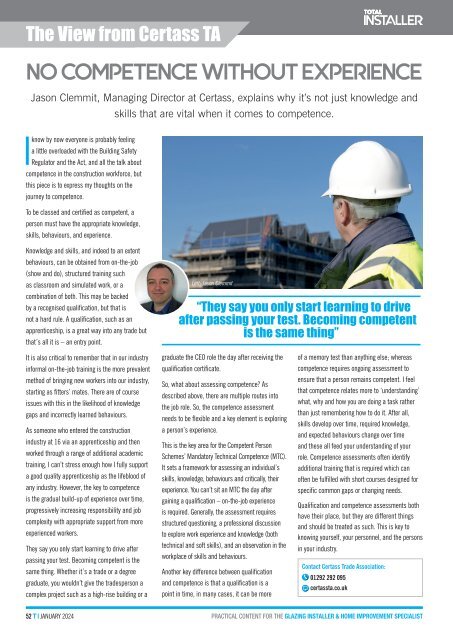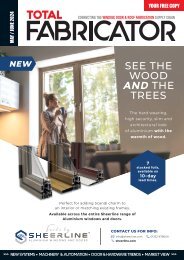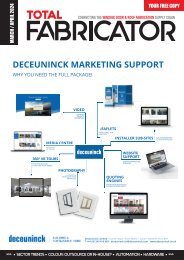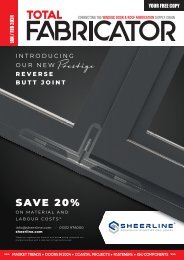January 2024
Create successful ePaper yourself
Turn your PDF publications into a flip-book with our unique Google optimized e-Paper software.
Contract The View Talk from Certass TA<br />
NO COMPETENCE WITHOUT EXPERIENCE<br />
Jason Clemmit, Managing Director at Certass, explains why it’s not just knowledge and<br />
I<br />
know by now everyone is probably feeling<br />
a little overloaded with the Building Safety<br />
Regulator and the Act, and all the talk about<br />
competence in the construction workforce, but<br />
this piece is to express my thoughts on the<br />
journey to competence.<br />
To be classed and certified as competent, a<br />
person must have the appropriate knowledge,<br />
skills, behaviours, and experience.<br />
skills that are vital when it comes to competence.<br />
Knowledge and skills, and indeed to an extent<br />
behaviours, can be obtained from on-the-job<br />
(show and do), structured training such<br />
as classroom and simulated work, or a<br />
combination of both. This may be backed<br />
by a recognised qualification, but that is<br />
not a hard rule. A qualification, such as an<br />
apprenticeship, is a great way into any trade but<br />
that’s all it is – an entry point.<br />
Left: Jason Clemmit<br />
“They say you only start learning to drive<br />
after passing your test. Becoming competent<br />
is the same thing”<br />
It is also critical to remember that in our industry<br />
informal on-the-job training is the more prevalent<br />
method of bringing new workers into our industry,<br />
starting as fitters’ mates. There are of course<br />
issues with this in the likelihood of knowledge<br />
gaps and incorrectly learned behaviours.<br />
As someone who entered the construction<br />
industry at 16 via an apprenticeship and then<br />
worked through a range of additional academic<br />
training, I can’t stress enough how I fully support<br />
a good quality apprenticeship as the lifeblood of<br />
any industry. However, the key to competence<br />
is the gradual build-up of experience over time,<br />
progressively increasing responsibility and job<br />
complexity with appropriate support from more<br />
experienced workers.<br />
They say you only start learning to drive after<br />
passing your test. Becoming competent is the<br />
same thing. Whether it’s a trade or a degree<br />
graduate, you wouldn’t give the tradesperson a<br />
complex project such as a high-rise building or a<br />
graduate the CEO role the day after receiving the<br />
qualification certificate.<br />
So, what about assessing competence? As<br />
described above, there are multiple routes into<br />
the job role. So, the competence assessment<br />
needs to be flexible and a key element is exploring<br />
a person’s experience.<br />
This is the key area for the Competent Person<br />
Schemes’ Mandatory Technical Competence (MTC).<br />
It sets a framework for assessing an individual’s<br />
skills, knowledge, behaviours and critically, their<br />
experience. You can’t sit an MTC the day after<br />
gaining a qualification – on-the-job experience<br />
is required. Generally, the assessment requires<br />
structured questioning, a professional discussion<br />
to explore work experience and knowledge (both<br />
technical and soft skills), and an observation in the<br />
workplace of skills and behaviours.<br />
Another key difference between qualification<br />
and competence is that a qualification is a<br />
point in time, in many cases, it can be more<br />
of a memory test than anything else; whereas<br />
competence requires ongoing assessment to<br />
ensure that a person remains competent. I feel<br />
that competence relates more to ‘understanding’<br />
what, why and how you are doing a task rather<br />
than just remembering how to do it. After all,<br />
skills develop over time, required knowledge,<br />
and expected behaviours change over time<br />
and these all feed your understanding of your<br />
role. Competence assessments often identify<br />
additional training that is required which can<br />
often be fulfilled with short courses designed for<br />
specific common gaps or changing needs.<br />
Qualification and competence assessments both<br />
have their place, but they are different things<br />
and should be treated as such. This is key to<br />
knowing yourself, your personnel, and the persons<br />
in your industry.<br />
Contact Certass Trade Association:<br />
01292 292 095<br />
certassta.co.uk<br />
52 T I JANUARY <strong>2024</strong> PRACTICAL CONTENT FOR THE GLAZING INSTALLER & HOME IMPROVEMENT SPECIALIST
















